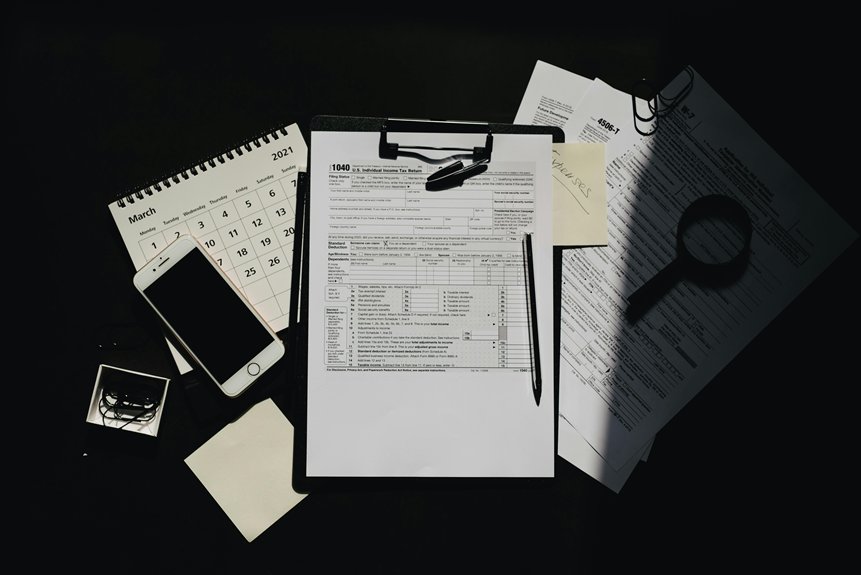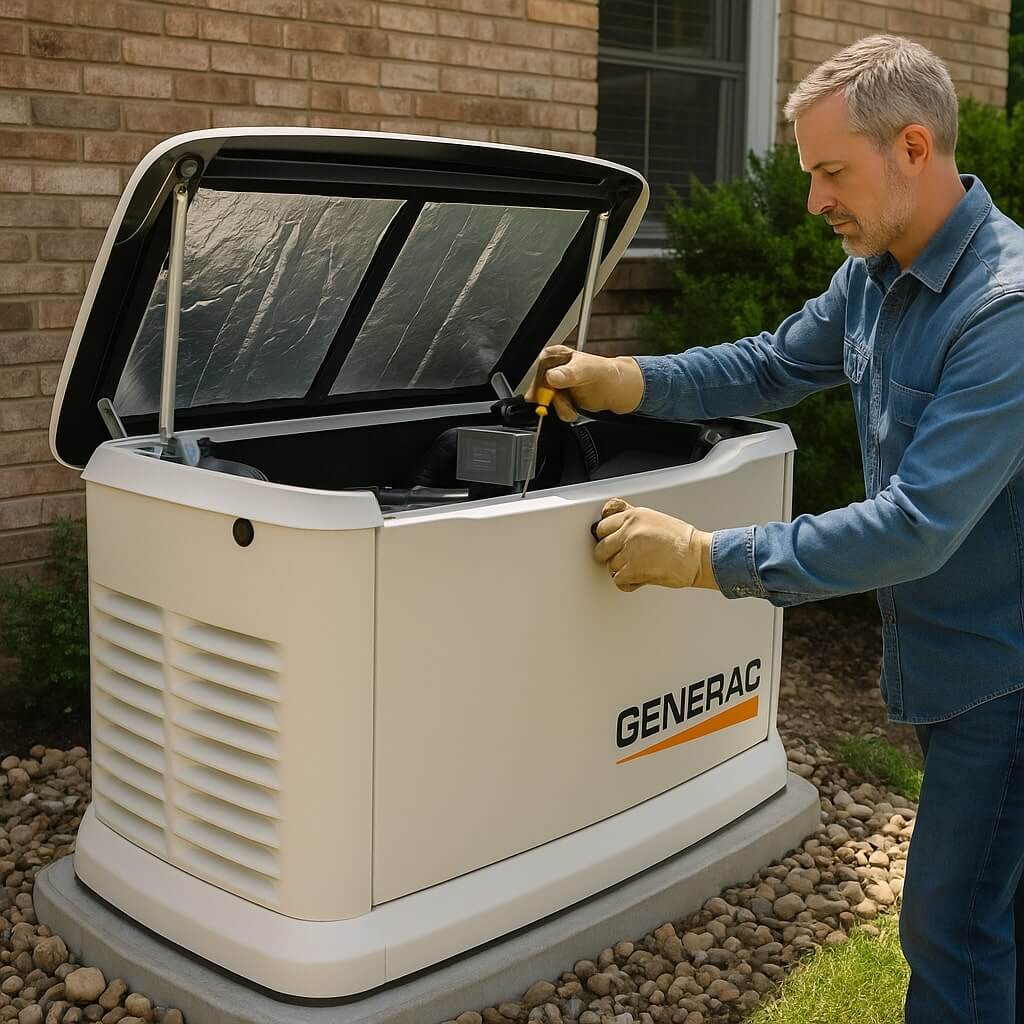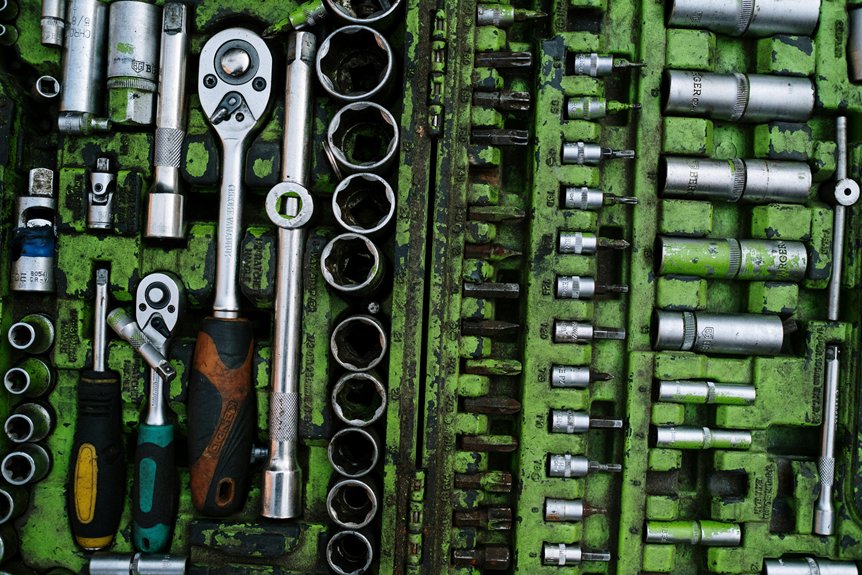Keeping your home in good shape requires regular upkeep. You might not realize how many essential tasks need attention throughout the year. From checking air filters to inspecting your roof, a little proactive maintenance can save you time and money in the long run. Let’s explore ten key tasks you should add to your calendar to guarantee your home remains safe and efficient. You’ll want to stay ahead of potential issues that could arise.
Key Takeaways
- Change HVAC air filters every 1-3 months to improve air quality and energy efficiency.
- Schedule annual professional HVAC inspections to catch potential issues early.
- Clean gutters and downspouts twice a year to prevent clogs and foundation damage.
- Test smoke and carbon monoxide detectors monthly, replacing batteries every 6-12 months.
- Conduct plumbing checks annually to detect leaks and maintain proper water flow.
Check and Replace Air Filters

One essential home maintenance task you shouldn’t overlook is checking and replacing your air filters.
Regularly changing these filters is vital for maintaining good air quality in your home. When filters get clogged, they restrict airflow, making your HVAC system work harder and reducing energy efficiency.
Regular filter changes are crucial for air quality and energy efficiency; clogged filters force your HVAC to work harder.
By replacing them every 1-3 months, you not only enhance air quality but also save on energy bills.
Take a moment to inspect your filters; if they look dirty or discolored, it’s time for a change.
Your lungs and wallet will thank you for this simple yet impactful task!
Inspect Smoke and Carbon Monoxide Detectors
It’s essential to inspect your smoke and carbon monoxide detectors regularly to guarantee your safety.
Start by checking the battery life and testing the alarm functionality to make certain they’re working properly.
Don’t forget to clean the units as dust can interfere with their operation.
Check Battery Life
As you tackle your home maintenance tasks, don’t overlook the importance of checking the battery life in your smoke and carbon monoxide detectors. Regular battery replacement is essential for your safety. Generally, replace the batteries at least once a year, and remember that smoke detectors have a lifespan of about 10 years. Here are some quick battery replacement tips:
| Task | Frequency |
|---|---|
| Check battery life | Monthly |
| Replace batteries | Every 6-12 months |
| Test alarms | Monthly |
| Replace detectors | Every 10 years |
| Clean detectors | Every 6 months |
Stay safe by keeping your detectors in check!
Test Alarm Functionality
Now that you’ve checked the battery life in your smoke and carbon monoxide detectors, it’s time to verify they’re functioning properly.
Start with alarm testing by pressing the test button on each unit. You should hear a loud beep, indicating it’s working effectively.
For functionality verification, confirm your detectors are installed in the right locations—near sleeping areas and on each level of your home.
If a detector doesn’t respond, replace it immediately.
Regular inspection like this can save lives, so make it a habit to test your alarms monthly. Your safety is worth the effort!
Clean Detector Units
Cleaning your smoke and carbon monoxide detectors is essential for guaranteeing they operate effectively.
Here are some important detector maintenance tips:
- Dust Regularly: Use a vacuum or soft cloth to remove dust and debris from the units.
- Test Alarms Monthly: Utilize alarm testing methods by pressing the test button to verify they sound properly.
- Replace Batteries: Change batteries at least once a year to keep them functional.
- Check Expiry Dates: Detectors typically last 7-10 years; replace them when necessary.
Staying on top of these tasks helps keep your home safe and gives you peace of mind.
Clean Gutters and Downspouts
Your gutters and downspouts play an important role in directing rainwater away from your home, so keeping them clean is crucial for preventing water damage.
Regular gutter maintenance helps avoid clogs that can overflow and damage your foundation or landscaping. Aim to clean them at least twice a year, especially before heavy rain seasons.
Use a sturdy ladder, gloves, and a scoop to remove debris, then flush the gutters with water. Don’t forget about downspout cleaning; verify they’re clear and directing water away from your home.
Keeping everything in top shape protects your investment and enhances your home’s longevity.
Service Your HVAC System
To keep your HVAC system running efficiently, changing your air filters regularly is essential.
This simple task helps improve air quality and reduces strain on your system.
Don’t forget to schedule professional inspections annually to catch any potential issues before they become costly repairs.
Change Air Filters Regularly
Changing air filters regularly is one of the simplest yet most effective tasks you can do to maintain your HVAC system.
It greatly improves your home’s air quality and guarantees your system runs efficiently.
Here’s how to get started:
- Identify filter types: Know whether you need HEPA, pleated, or fiberglass filters.
- Check monthly: Make it a habit to inspect your filters at least once a month.
- Replace as needed: Change filters every 1-3 months, depending on usage and filter type.
- Keep track: Mark your calendar or set reminders to stay on schedule.
Stay proactive for cleaner air!
Schedule Professional Inspections Annually
While regular maintenance can keep your HVAC system running smoothly, scheduling professional inspections annually is essential for long-term efficiency and reliability.
These inspections help identify potential issues before they escalate, ensuring your system operates at peak performance.
Pair your HVAC check with an annual roof inspection and a seasonal electrical check to cover all bases.
This thorough approach not only enhances your home’s comfort but also prolongs the lifespan of your systems.
Don’t wait for a breakdown; mark your calendar and book these vital inspections to maintain a safe and efficient home environment throughout the year.
Test Your Water Heater
When you test your water heater regularly, it guarantees peak performance and extends its lifespan.
Proper water heater maintenance not only guarantees hot water when you need it but also boosts energy efficiency.
Here’s how to test your water heater:
- Check the temperature: Set it to 120°F for best performance.
- Inspect the pressure relief valve: Lift the lever to release a little water; it should flow freely.
- Flush the tank: Remove sediment buildup by draining a few gallons.
- Look for leaks: Check connections and the tank for any signs of leakage.
Stay proactive, and your water heater will reward you with reliability!
Seal Windows and Doors
After ensuring your water heater is functioning efficiently, it’s time to focus on sealing windows and doors.
Proper window insulation can dramatically reduce energy costs and improve comfort in your home. Check for gaps and apply caulk where needed.
Don’t forget about door weatherstripping; it’s essential for preventing drafts and keeping your space cozy. Replace any worn or damaged strips, ensuring a snug fit.
These simple tasks not only enhance energy efficiency but also prolong the lifespan of your heating and cooling systems.
Inspect Roof and Attic
Before winter arrives, it’s crucial to inspect your roof and attic to prevent costly damage down the line.
Regular roof maintenance and proper attic insulation can save you from headaches later.
Consistent roof upkeep and effective attic insulation can help you avoid future troubles.
Here’s what you should check:
- Shingles: Look for any missing, cracked, or curling shingles.
- Gutters: Verify they’re clear of debris to avoid water buildup.
- Insulation: Check if your attic insulation is adequate and intact.
- Ventilation: Confirm proper airflow to prevent moisture buildup, which can lead to mold.
Maintain Lawn and Garden
As the seasons change, maintaining your lawn and garden becomes essential to guarantee they thrive through winter.
Start with regular lawn care, including aerating and fertilizing to promote healthy growth. Trim back any overgrown shrubs and remove dead plants to keep your garden looking neat.
Consider garden planning by choosing winter-friendly plants, like evergreens or ornamental grasses, that can withstand colder temperatures.
Don’t forget to mulch around your plants to retain moisture and insulate their roots.
Finally, make sure your irrigation system is properly winterized to prevent damage.
Stay proactive, and your outdoor space will flourish year-round!
Clean and Inspect Appliances
Regularly cleaning and inspecting your appliances can extend their lifespan and enhance efficiency.
Proper appliance maintenance not only keeps your home running smoothly but also guarantees appliance safety.
Effective appliance upkeep ensures a smoothly operating home while prioritizing safety for you and your family.
Here’s a quick checklist to follow:
- Wipe down surfaces: Remove dust and grime from the exterior and interior.
- Check for leaks: Inspect hoses and connections for any signs of wear or damage.
- Clean filters: Regularly clean or replace filters in your dishwasher, refrigerator, and dryer.
- Test functionality: Verify all settings and features work properly to prevent future issues.
Taking these steps helps you enjoy a safer, more efficient home!
Schedule Plumbing Checks

Scheduling plumbing checks at least once a year can save you from costly repairs down the line. During these checks, a professional can perform essential leak detection to catch any hidden issues before they escalate. You wouldn’t want a small leak to turn into extensive water damage!
Additionally, drain cleaning is vital; it helps prevent clogs and maintains proper water flow. By setting a regular schedule for plumbing inspections, you’ll guarantee your home’s plumbing system runs smoothly and efficiently.
Don’t wait for problems to arise—proactive maintenance is key to protecting your investment and keeping your home safe.
Conclusion
By keeping up with these ten essential home maintenance tasks, you’ll not only guarantee a safer and more efficient living environment, but you’ll also save time and money in the long run. Setting reminders for air filter changes, detector tests, and biannual gutter cleanings can make all the difference. Regular inspections and maintenance keep your home in top shape, so grab your calendar and start scheduling these tasks today—your future self will thank you!




